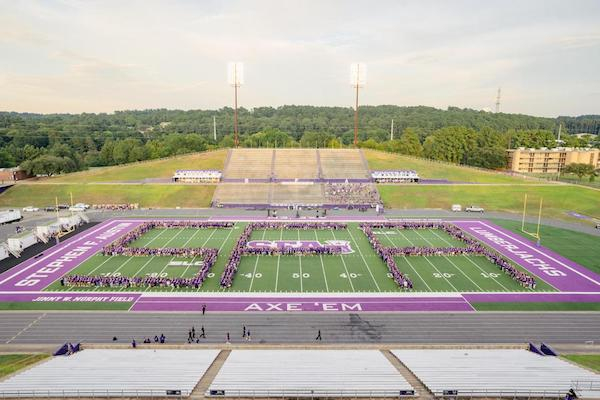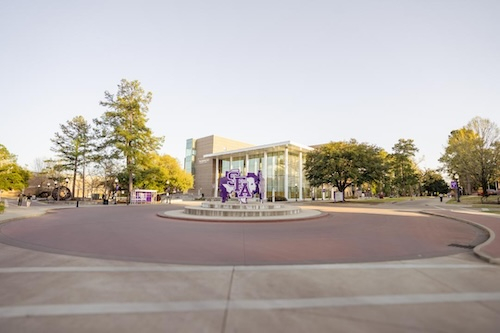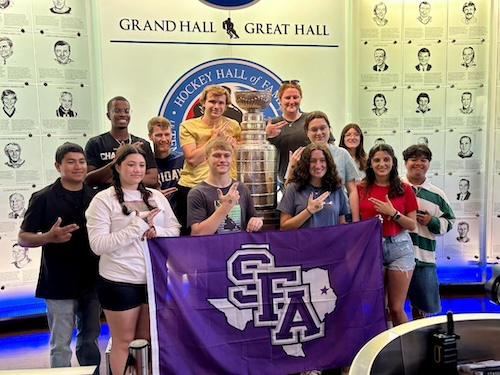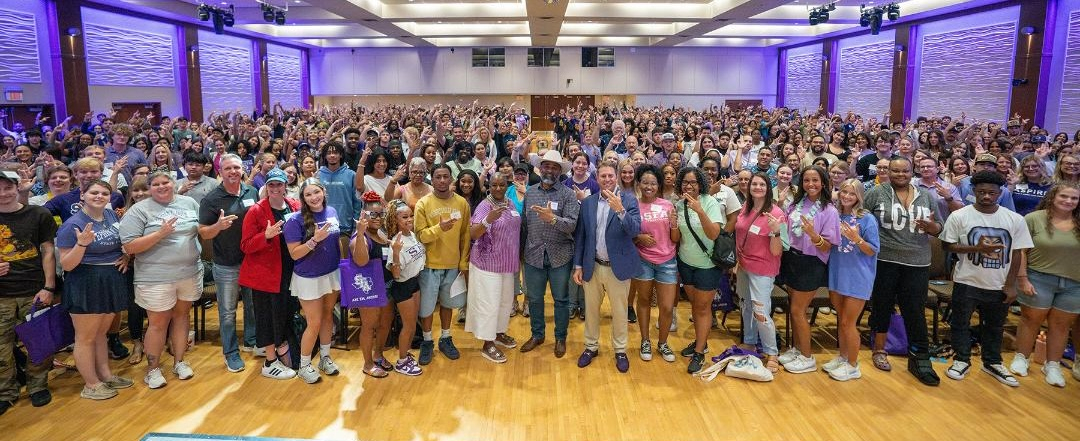SFA University

Stephen F. Austin State University kicked off the 2025 fall semester Monday with its largest first-time undergraduate class ever. The university also celebrated its first increase in total enrollment since fall 2018. SFA’s largest freshman class, pictured, gathered for a photo ahead of last week’s Holler at Homer event.
August 30, 2025 – Stephen F. Austin State University kicked off the 2025 fall semester Monday with its largest first-time undergraduate class ever. The university also celebrated its first increase in total enrollment since fall 2018.
“This historic milestone reflects the growing confidence in SFA's mission, our outstanding faculty and staff, and the transformative experience we provide,” said Dr. Neal Weaver, SFA president. “Reaching record enrollment is not just a number — it's a testament to the dedication of our Lumberjack community and the bright future ahead for every student who chooses to call SFA home.”
According to the university’s early enrollment data, SFA welcomed nearly 2,800 first-time undergraduate students, up 31% compared to last year. Transfer student enrollment increased by 16%, and total enrollment is up 7% from fall 2024.
The new fall enrollment record is a reflection of The University of Texas System’s investment to expand SFA’s Purple Promise program, which covers tuition and fees for families earning $100,000 gross income or less. It’s also a result of new initiatives like the Lumberjack Transfer Alliance and Lumberjack Launch to improve access, support and college readiness for students across Texas, said Dr. Kent Willis, senior vice president for enrollment and student engagement at SFA.
“Students are looking for the personal touch of a close-knit and safe campus that also provides rigorous academics, strong career preparation, and opportunities for leadership, service and social engagement at an affordable price,” Willis said. “SFA offers all that along with the power and prestige of the UT System.”
The increase in enrollment has led to an increase in semester credit hours, which are up 9% over fall 2024. This marks SFA’s highest number of semester credit hours since fall 2020 and the first annual (fall to fall) increase since fall 2021. In Texas, state lawmakers use a formula driven by weighted semester credit hours to determine the funding for public universities.
Enrollment highlights:
- 7% increase in total headcount
- 9% increase in semester credit hours
- 16% increase in first-time transfer students
- 31% increase in first-time undergraduate students
- 12% increase in first-time undergraduate applications
- 25% increase in admitted first-time undergraduate students
- 21% increase in first-time transfer applications
- 18% increase in admitted first-time transfer students
Official enrollment data reported to the Texas Higher Education Coordinating Board will be available following the 20th class day.
Applications for the fall 2026 semester are officially open, and students can apply today at sfasu.edu/apply. High school students and their families exploring universities can learn more about SFA by visiting sfasu.edu/lumberjackfamily, scheduling a campus tour at sfasu.edu/visit, and viewing SFA’s episode of Amazon Prime Video’s “The College Tour,” which premieres September 1 at sfasu.edu/tct.

With record enrollment growth and increased interest in Stephen F. Austin State University, The University of Texas System has announced an investment of $37 million to fund deferred maintenance projects to refresh and revitalize the Nacogdoches campus.
August 28, 2025 - The University of Texas System Board of Regents allocated $37 million to fund deferred maintenance projects to refresh and revitalize Stephen F. Austin State University’s campus during their regular August meeting.
“These funds come at a pivotal moment for SFA,” said Dr. Neal Weaver, SFA president. “As we welcome record enrollment growth and unprecedented interest in our university, this investment ensures our facilities match the quality of the student experience we provide. We are grateful for the continued support of the UT System and look forward to enhancing one of the most beautiful campuses in Texas for current and future Lumberjacks.”
The funds will be distributed over three years, beginning in fiscal year 2026 and ending fiscal year 2028. The allocation methodology uses Permanent University Fund debt to address deferred maintenance for qualifying spaces, which excludes student housing, intercollegiate athletics or auxiliary enterprises.
“The Board of Regents is proud to continue its investments in SFA’s facilities,” said Kevin Eltife, chair of the UT System Board of Regents. “As pledged when SFA became part of the UT System, we will always ensure that our students have access to the best environments for learning and research, and we enthusiastically support President Weaver’s master plan to do just that.”
With this allocation, SFA joins peer institutions across the UT System in benefiting from $1.19 billion of PUF proceeds for capital projects addressing deferred maintenance.
“This investment could not come at a better time,” said John Branch, associate vice president for facilities services and campus operations. “As we wrap up our campus master plan process, UT System’s support allows us to immediately align these resources with the priorities identified for our campus. Their support is vital to ensuring our facilities and campus infrastructure continue to inspire and serve generations of Lumberjacks.”
Campus Master Plan Open House
SFA invites the community to participate in the campus master plan open house from 10am to 5pm September 9 in the Baker Pattillo Student Center Regents’ Suite B. Guests are invited to come and go, view materials and provide feedback. At 5:30pm, Freese and Nichols, the firm leading the planning process, will deliver a presentation outlining the vision for SFA’s future campus development.
To learn more about the campus master plan scope and timeline, visit sfasu.edu/masterplan.

August 27, 2025 - A dozen business students from Stephen F. Austin State University’s Nelson Rusche College of Business wrapped up their management course by exploring sports business, entrepreneurship and innovation in Canada Aug. 11-19.
“During this study abroad trip, students experienced not only Canadian culture but also how Canadians innovate, launch businesses and celebrate sport,” said Dr. Jason Reese, interim dean of the Rusche College of Business, who led the trip with Dr. Robert McDermand, senior lecturer of sports business and management at SFA.
“Canada’s traditions are so beloved — from hockey to maple syrup to Niagara Falls — that the students immediately embraced them,” Reese said. “But they also learned important lessons like how to navigate the streets of Toronto and Montreal through public transit. Experiences like these build their confidence for future adventures abroad.”
In Toronto, students visited the waterfront, the Hockey Hall of Fame and the Royal Ontario Museum before heading up the CN Tower for a bird’s-eye view of the city and Lake Ontario. They also took the famous Maid of the Mist boat tour to see Niagara Falls up close.
“Niagara Falls is one of the highlights of the trip because it was something that I probably would have never done or had the opportunity to do without the study abroad trip,” said Erin Banks, sports business senior from Georgetown. “As we got closer to the falls, I had to close my eyes from all the water spraying on my face, and all I could do was laugh because I couldn’t believe that I was in this place with these people experiencing such a special adventure.”
Next, students mastered the “OK Blue Jays” dance with help from passionate baseball fans during the seventh-inning stretch of a Toronto Blue Jays game at Rogers Centre.
“Seeing Xander [Bogaerts] celebrating with strangers and everyone being united by their love for their Blue Jays was unforgettable,” said Dayanira Flores, sports business sophomore from Mission. “That moment made me realize that sports are powerful connectors, bringing people together in shared joy. I remember thinking this was the highlight of my trip because it made me feel alive — part of something bigger than myself.”
In Montreal, students learned about the 2020 launch of SportsAi, a sports analytics startup that uses artificial intelligence to automate data collection and analysis for soccer players and coaches to help them improve players’ performance.
Tarik Agday, co-founder and CEO of SportsAi, shared his story of combining his experience as a former MLS prospect for CF Montreal with his AI specialization at Polytechnique Montreal to provide real-time analysis for soccer teams.
“Tarik also told us how he overcame the challenges of introducing new technologies in an industry full of traditionalists,” McDermand said. “This showed our students how innovation, perseverance and the entrepreneurial spirit can lead to a successful business supporting a sport they love.”
The CF Montreal theme continued with a soccer match between the team and DC United, which offered some students a once-in-a-lifetime opportunity.
“I’m a huge soccer fan, so getting to watch CF Montreal play against DC United was amazing,” said Modesto Martinez, kinesiology first-year student from Mission. “For me, going to a live soccer game and seeing the action in person was a dream come true, and I hope one day I can do it again.”
Despite their packed agenda, the students had time to enjoy some delicious meals. They returned home with a few new favorite foods.
“Trying poutine for the first time was messy but delicious, and BeaverTail pastries instantly became the best thing I’ve ever eaten,” said Madison Zaccardo, Master of Business Administration student from Lubbock.
Helena Easey, entrepreneurship senior from Cypress, said the traveling group’s small size allowed her to bond with every student on the trip.
“I learned to expand my interests into areas I never thought I would,” she said. “I’m so grateful to the Rusche College of Business for supporting its students in academic ventures such as this one.”
Reed O’Grady, management senior from Weatherford, also saw benefits to traveling with his business classmates.
“One of the convenient things about doing a study abroad with the Rusche College of Business is that you are traveling with your peers the entire trip,” he said. “I was able to not only talk with my classmates but relate on a deeper level because we were all in the same season of life, going through the same classes, and a few of us will be in the same classes in the fall.”
Ella Hollis, marketing senior from Tyler, said learning outside the classroom helped her learn more about herself.
“After coming home from this trip, I feel that I have more confidence as an individual to go out and do more in unfamiliar places with unfamiliar people, whether it is for personal or business matters,” she said. “This trip created many opportunities to learn and better myself as an individual in moments that made learning more fun and enjoyable than what it could have been in just a regular classroom experience.”
For more information on SFA’s Rusche College of Business and its study abroad opportunities, visit sfasu.edu/cob.
August 13, 2025 –– Stephen F. Austin State University’s SFA Gardens will host a fruit research field day from 9am to 3pm September 19 featuring kiwifruit, muscadine grapes, blueberries, figs, feijoas and other fruits.
Speakers will include Dr. David Creech, director of SFA Gardens, with “The SFA Gardens’ Fruit Research Plots” and Dr. Tim Hartmann, Texas A&M University’s Department of Horticultural Sciences, with a talk on “Alternative Fruits for the Home Orchard or Commercial Field.”
The day will start at 9am with presentations at the Brundrett Conservation Education Building in the Pineywoods Native Plant Center, located at 2900 Raguet Street. There will be a break for attendees to leave for lunch. After the break, participants will then go to the fruit research plots at SFA Gardens around 1pm.
The cost of the field day is $15 per person. Register on-site the day of the event or in advance online at sfasu.edu/gardens.
For more information, email sfagardens@sfasu.edu.

For the first time in its history, Stephen F. Austin State University has received over 20,000 undergraduate applications for a fall semester, marking a 17% increase over fall 2024 applications and a 67% rise since 2019. SFA also served more than 3,000 students during summer orientation sessions like the one pictured, marking the largest summer orientation attendance in SFA’s history.
August 7, 2025 –– For the first time in its history, Stephen F. Austin State University has received over 20,000 undergraduate applications for a fall semester, marking a 17% increase over fall 2024 applications and a 67% rise since 2019.
The surge follows The University of Texas System’s investment to expand SFA’s Purple Promise program, which covers tuition and fees for families earning $100,000 gross income or less. It’s also a result of new initiatives like the Lumberjack Transfer Alliance and Lumberjack Launch to improve access, support and college readiness for students across Texas.
“We’re incredibly energized by the excitement surrounding SFA right now,” said SFA President Dr. Neal Weaver. “This explosive growth speaks volumes about the momentum behind the SFA brand. Crossing the 20,000 threshold is a milestone achievement and a reflection of the academic strength, value and sense of belonging that define the SFA experience. Students and families across the state and beyond are taking notice.”
Due to the overwhelming interest, SFA added an extra in-person orientation session to accommodate students and families who plan to attend. In total, the university served more than 3,000 students during summer orientation, marking the largest summer orientation attendance in SFA’s history.
“This surge in applications and positive early enrollment data signals the strength of our strategic outreach, recruiting and marketing, as well as the appeal of our academic and student life offerings,” said Dr. Kent Willis, senior vice president for enrollment and student engagement at SFA. “From prospective first-year students to transfer and graduate students, more individuals are choosing SFA and committing to becoming Lumberjacks.”
These numbers and early enrollment trends show not only more applications but also stronger yield, retention and growth across first-time undergraduates, transfer students and graduate programs. The incoming first-time undergraduate class is currently on pace to be the largest in the university’s history.
“These numbers represent expanded opportunity for students and families across our region and beyond,” Willis said. “Through programs like Purple Promise, Lumberjack Transfer Alliance and Lumberjack Launch, we’re breaking down barriers and making it easier for students to achieve a four-year degree. Our recent integration into the UT System has only accelerated this progress, providing our students with even greater resources, support and connections within one of the world’s most respected public university systems.”
To learn more and apply for SFA’s fall 2025 semester, visit sfasu.edu/apply.
About Stephen F. Austin State University
Stephen F. Austin State University, the newest member of The University of Texas System, began a century ago as a teachers’ college in Texas’ oldest town, Nacogdoches. Today, it has grown into a regional institution comprising six colleges — business, education, fine arts, forestry and agriculture, liberal and applied arts, and sciences and mathematics. Accredited by the Southern Association of Colleges and Schools, SFA enrolls approximately 11,000 students while providing the academic breadth of a state university with the personalized attention of a private school. The main campus encompasses 421 acres that include 40 academic facilities, 11 residence halls, and 68 acres of recreational trails that wind through its six gardens. The university offers more than 80 bachelor’s degrees, more than 40 master’s degrees and four doctoral degrees covering over 120 areas of study. Learn more at sfasu.edu.
July 31, 2025 - Stephen F. Austin State University’s Counseling Services is now offering students, faculty and staff a new suicide prevention training program called Caring Jacks to create an environment where open conversations about suicide are met with compassion and support, helping build a community of care and connection.
“The Caring Jacks crisis response and suicide prevention training not only builds on the success of previous efforts but also aligns with The University of Texas System’s broader initiative to reduce suicide among college students across Texas campuses, ensuring that SFA remains at the forefront of mental health and crisis intervention education,” said Clare Fite, director of SFA Counseling Services.
Rooted in evidence-based, up-to-date methodologies, Caring Jacks replaces the Question, Persuade, Refer bystander intervention training Counseling Services used for over a decade.
“Since launching suicide prevention training at SFA, more students are actively engaging with crisis support services through Counseling Services, and we’ve observed positive trends in student safety and well-being,” Fite said. “These outcomes highlight the impact of awareness, education and proactive support. Together, we can reduce the stigma and risk of suicide — because at SFA, we're not just Lumberjacks, we're caring Jacks.”
Through a combination of expert-led presentations, real-life scenarios, role-playing activities and reflective discussion, Caring Jacks participants learn how to recognize the signs and symptoms of a suicide crisis, communicate with empathy and confidence, respond effectively and take informed action, and connect individuals to appropriate campus and community resources.
Two trainings are available. In the 50-minute introductory training, participants learn how to recognize the signs and symptoms of suicide, understand varying levels of crisis, strengthen supportive communication skills, and gain awareness of mental health resources.
For more in-depth training, Counseling Services offers a 90-minute comprehensive training. This extended session offers instruction on motivational interviewing techniques, empathetic communication and mental health first-aid principles.
Participants who complete the full training receive a certificate of completion, recognizing their preparedness to intervene and support others in crisis. To learn more about SFA's mental health resources, visit the Health and Wellness Hub webpage at sfasu.edu/thehub and the Lumberjack Wellness Network at sfasu.edu/lwn.

July 29, 2025 - Cole Tomberlain, president of The Tomberlain Insurance Group based in Longview, will give the commencement address during Stephen F. Austin State University’s summer graduation ceremony for undergraduates at 3 p.m. Friday, Aug. 8, in Johnson Coliseum. All master’s and doctoral candidates will receive their degrees during the Graduate Studies ceremony at 6 p.m. Thursday, Aug. 7, in Turner Auditorium, Griffith Fine Arts Building.
After graduating from Spring Hill High School in Longview, Tomberlain attended SFA, following in the footsteps of his parents, Chuck and Babette, and received a Bachelor of Business Administration in 2010. While a student, he was a volunteer firefighter and a member of the SFA chapter of Ducks Unlimited and the National Wild Turkey Federation. He also participated in the Student Activities Association and cofounded Sigma Alpha Epsilon, Texas Phi Chapter.
Tomberlain’s family have been similarly active in Lumberjack life. His sister, Morgan, served as a student regent for the SFA Board of Regents. His father was president of the SFA Alumni Association Board of Directors. Simultaneously, Tomberlain served as the executive director of SFA’s Student Foundation Association.
“Mr. Tomberlain exemplifies what it means to be an SFA graduate — prepared, capable and committed to making a difference from day 1,” said Dr. Neal Weaver, SFA president. “When his family business needed leadership, he stepped up without hesitation at just 24 years old. He shows our graduates where dedication and an SFA education can take you.”
Tomberlain took over both Charles Tomberlain Insurance Agency and Tomberlain Properties following a family crisis in 2013. Under his leadership, the agency has earned several awards, including the Safeco Insurance Award of Excellence and the Longview Chamber of Commerce Small Business of the Year. The agency also has received the Liberty Mutual President’s Award for 15 consecutive years and was inducted into the Foremost Insurance Hall of Fame in 2016.
Tomberlain also has earned individual recognition, including being voted the Best Insurance Agent in East Texas four consecutive years. He has served on the Liberty Mutual Central Region Advisory Council and the Safeco Insurance National Advisory Council.
“I am honored to return to SFA to speak to my fellow Lumberjacks as they transition into the next phase of their lives,” Tomberlain said. “SFA doesn’t just give you a degree, it gives you an extended family of alumni who are here to help support you on your path to success!
“While in Nacogdoches, many SFA students find out who they are meant to be and develop the dreams they will chase when they graduate,” he continued. “As they step into their next chapter, these graduates will carry with them what they learned not just in the classroom but also in their student organizations and leadership programs. I am looking forward to celebrating with them.”
In addition to his insurance work, Tomberlain has assisted with several nonprofits. He was the founding chair of Bourbon & Bowties, the official fundraiser for the Longview World of Wonders hands-on discovery center that has netted nearly $2 million for the museum. He also was a founding board member of the Young Professionals of Longview, Combat Warriors of East Texas and the East Texas Bourbon Society.
Tomberlain continues to give back to his alma mater through his service on the Business Communication and Legal Studies Advisory Council in SFA’s Nelson Rusche College of Business as well as The University of Texas System’s Chancellor’s Centurions. He received the Outstanding Young Alumnus Award from the SFA Alumni Association in 2019, making him and his father the first father-son duo to receive the honor. Kendall, Tomberlain’s wife, obtained her master’s degree in counseling from SFA in 2023, and their son, Liam, served as crown bearer at the SFA Homecoming football game that same year.
The public is invited to attend the graduation ceremonies, and community tickets will be issued on a first-come, first-served basis at the coliseum ticket office and the Fine Arts Box Office one hour before each event begins.
Degrees to be awarded include 230 bachelor’s, 68 master’s and 10 doctoral degrees. Seventy-one students will graduate with honors, including 28 cum laude, 21 magna cum laude and 22 summa cum laude. Two students will graduate with the university scholar designation.
For more information, visit sfasu.edu/graduation.
July 14, 2025 – The excitement is building at Stephen F. Austin State University, where extraordinary momentum in student enrollment has prompted the addition of a first-year student AXEcepted Day orientation session July 31.
With more incoming Lumberjacks confirming their plans to attend SFA, the university has added an extra AXEcepted Day session to accommodate the increase in participants. This marks a significant moment of growth and energy for the university, signaling that more students are choosing to say, "Axe 'em, Jacks!"
"This is a great problem to have," said Dr. Kent Willis, senior vice president for enrollment and student engagement at SFA. "We're thrilled to see so many students choosing SFA as their college home. The enthusiasm around becoming a Lumberjack is undeniable, and we’re excited to welcome each of these new students to campus."
SFA's orientation program is a crucial first step in helping students and their families transition to life at the university. During the single-day AXEcepted Day event, new Lumberjacks connect with peers, meet faculty and staff, receive academic advising, and learn about campus resources while family members get tips on how to support their students during their first year at college.
After they move in for the fall semester, first-year students will attend Lumberjack Life, August 22-23, to learn more about SFA's traditions and become familiar with campus before fall classes begin August 25.
Registration is now open for the July 31 session at sfasu.edu/register-orientation.
Students who have been accepted to SFA for the fall 2025 semester and are ready to take their next steps can find full orientation details at sfasu.edu/orientation.
"There's never been a better time to be a Lumberjack," Willis said. "This wave of interest in SFA shows just how strong our community, academic programs and campus culture really are."

Pictured, from left, are Miguel Koch, political science major from Allen; Dylan Miles, political science major from Center; Wil Stafford, management major from Lufkin; Trent Bush, political science major from Timpson; and Sydney Shifflett, criminal justice major from Carrollton. Photo provided by Dr. Charlotte Sullivan, SFA’s director of government relations.
Students Include Two Local Shelby County Interns
June 6, 2025 – Through Stephen F. Austin State University’s Legislative Internship Program, five students served during the 89th Texas Legislature and learned the intricacies of Texas lawmaking and civic leadership. While gaining hands-on experiences, they left a strong impression in Austin.
Interns during the spring 2025 semester included Trent Bush, political science major from Timpson; Miguel Koch, political science major from Allen; Dylan Miles, political science major from Center; Sydney Shifflett, criminal justice major from Carrollton; and Wil Stafford, management major from Lufkin.
Started in 2009 under the leadership of the late Dr. Ken Collier, professor of government, the SFA Legislative Internship Program provides real-world, hands-on practical experiences to SFA students in law-making, issue advocacy and civic leadership during every regular session of the Texas Legislature. To date, more than 40 SFA students have served in the program. Over the years, interns have left such an impression in Austin that many state legislators contact the university seeking internships.
“Engaging with the Texas Legislature while they are in session provides the perfect laboratory for understanding how politics works in real time,” said Dr. Charlotte Sullivan, SFA’s director of government relations. “Students who go through the internship have an insight into politics that will benefit them no matter what career path they choose.”
Interns are selected through a competitive application process that includes a résumé, a personal statement and an in-person interview. Once selected, interns are matched with state legislative offices or legislative committees. To assist in this process, Sullivan works with the interns to mentor and guide them.
The interns arrived in Austin before the start of the spring semester and remained in Austin until the end of the regular session in late May. While in Austin, students received course credit toward their degree.
According to Koch, who worked in the office of State Sen. Robert Nichols, serving as a legislative intern was a catalyst for professional growth and confidence. He was able to learn the basics of legislative analysis through hands-on experiences rather than watching from the sidelines.
“Serving in the 89th Legislature has given me an incredibly unique perspective on what it means to shape the law,” Koch said. “Watching a bill go from an idea in Sen. Nichols’ office to codified statute was incredible as a political science student, and getting to experience those moments firsthand gave me a perspective that will certainly assist my time in law school.”
Miles, who worked in the committee office of State Sen. Brandon Creighton, felt the opportunity provided learning opportunities he wouldn’t have gained in a classroom setting.
“Working at the legislature is truly a one-of-a-kind experience,” Miles said. “There is no equivalent to the hands-on learning and insider perspective that it provides. Having studied state government previously, there was still a great deal I did not know about the norms of the legislative process that I would have otherwise never known.”
“I cannot begin to describe what working in Austin has meant to me,” Miles continued. “This has been my first step into the political and legal world, and had I been asked even a few weeks before having applied to the internship, I would not have thought it possible that I would be working at the state Capitol.”
For Bush, who served as constituent manager in the office of State Rep. Todd Hunter, the internship reignited his passion for politics. He noted how the internship program offered a refreshing perspective on the political process and the importance of cooperation.
“With the political climate being what it is these days, it is easy to feel like the entire career is just a never-ending battle with whichever ‘other team,’” Bush said. “This experience has shown me that even in a high-level political atmosphere, there are people willing to reach across the aisle with friendship.”
Shifflett served as a legislative assistant in the office of State Rep. Joanne Shofner. While in the position, she helped research and develop a bill that eventually passed.
“The most rewarding part of my internship was witnessing the legislative process from start to finish, particularly seeing a bill I had worked on pass and learning about its positive impact on Texans,” Shifflett said. “Hearing how a piece of legislation can improve lives or solve problems was incredibly fulfilling. Moments like those affirm the importance of public service and the real-world outcomes of our work.”
For Stafford, who served as a legislative aide in the office of State Rep. John Lujan, working with professionals on a daily basis inspired him and cemented his desire to pursue law school and one day open his own law firm.
“The most rewarding part was working alongside some of the smartest and most hardworking individuals I’ve ever met,” Stafford said. “Their dedication and professionalism inspired me daily. This internship has brought me closer to achieving my dream by being able to work alongside and receive advice from people who have achieved the same goals.”
New this session, thanks to SFA’s affiliation with The University of Texas System, students attended professional development sessions with key decision-makers in state government, received assistance with securing housing in Austin and obtained additional financial assistance beyond institutional support from SFA.
“Affiliation with the UT System has only enriched our ability to provide a well-rounded, engaging experience for our interns in Austin,” said Dr. Steven Galatas, associate professor in SFA’s Department of Government and campus coordinator for the program. “The UT System has taken an already great program to an even higher level.”
For more information about the Legislative Internship Program, visit the program’s website.
June 4, 2025 - Below is Stephen F. Austin State University’s calendar of events and key dates for the month of June through July 7.
Note: This calendar is not intended to be comprehensive; click the calendar links below for more events.
Showcase Saturday
10am to 3pm, June 7, in the Baker Pattillo Student Center Plaza
Showcase Saturday allows college-bound students and their families to experience life as an SFA Lumberjack. This in-person, on-campus event offers participants a unique opportunity to hear from academic deans, browse our academic fair representing more than 120 areas of study, take a campus tour and view residence halls.
The Basics of Designing Great Garden Borders
7pm, June 12, in the Brundrett Conservation Education Building
The SFA Gardens Theresa and Les Reeves Lecture Series features Bob Byers, director of Fort Worth Botanical Garden, for his presentation, "The Basics of Designing Great Borders.”
Juneteenth Holiday, June 19 - Campus will be closed.
Robotics and Coding Camp
8:30am to 12 noon, June 23-27 in the Cole STEM Building
This weeklong robotics and coding summer camp tailored for middle school students uses EV3 robots and FIRST LEGO League Challenge supplies to master block programming techniques. Cost is $100 per child.
Curious George: The Golden Meatball
June 25-28, in the Griffith Fine Arts Building, Flex Theatre
"Curious George: The Golden Meatball" is a loveable adventure, specifically designed for young audiences, that is sure to leave them singing and swinging down the aisles.
June meetup of the Piney Woods Entrepreneurship Network
5:30 to 7pm, June 25 at the Red House Winery
Community members, small business owners, entrepreneurs and SFA students are invited to come together and connect with, learn from and help each other.
Steel Magnolias
July 2-6 in the Griffith Fine Arts Building, Black Box Theatre
Set in a beauty salon in Chinquapin, Louisiana, “Steel Magnolias” features a group of southern ladies gossiping and sharing personal stories of their lives. A sudden realization of their mortality draws on their underlying strength — and love — which gives the play and its characters a special quality to make them truly touching, funny and marvelously amiable company in good times and bad.
Independence Day Holiday, July 4 - Campus will be closed.








